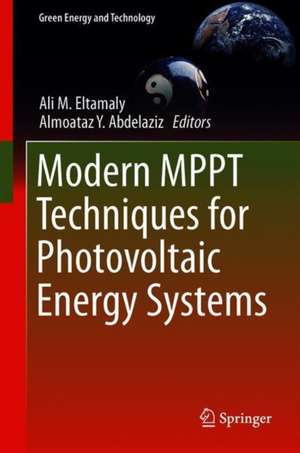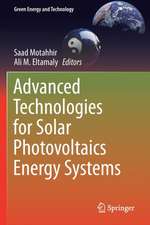Modern Maximum Power Point Tracking Techniques for Photovoltaic Energy Systems: Green Energy and Technology
Editat de Ali M. Eltamaly, Almoataz Y. Abdelazizen Limba Engleză Hardback – 13 aug 2019
This book introduces and analyses the latest maximum power point tracking (MPPT) techniques, which can effectively reduce the cost of power generated from photovoltaic energy systems. It also presents a detailed description, analysis, and comparison of various MPPT techniques applied to stand-alone systems and those interfaced with electric utilities, examining their performance under normal and abnormal operating conditions.
These techniques, which and can be conventional or smart, are a current hot topic, and this book is a valuable reference resource for academic researchers and industry professionals who are interested in exploring and implementing advanced MPPT for photovoltaic systems. It is also useful for graduate students who are looking to expand their knowledge of MPPT techniques.
Din seria Green Energy and Technology
- 18%
 Preț: 943.43 lei
Preț: 943.43 lei - 20%
 Preț: 629.52 lei
Preț: 629.52 lei - 18%
 Preț: 1124.92 lei
Preț: 1124.92 lei - 18%
 Preț: 947.35 lei
Preț: 947.35 lei - 15%
 Preț: 655.92 lei
Preț: 655.92 lei - 18%
 Preț: 957.62 lei
Preț: 957.62 lei - 18%
 Preț: 789.52 lei
Preț: 789.52 lei - 17%
 Preț: 464.55 lei
Preț: 464.55 lei - 15%
 Preț: 645.79 lei
Preț: 645.79 lei - 18%
 Preț: 903.93 lei
Preț: 903.93 lei - 24%
 Preț: 1322.07 lei
Preț: 1322.07 lei - 18%
 Preț: 890.54 lei
Preț: 890.54 lei - 18%
 Preț: 1115.46 lei
Preț: 1115.46 lei - 18%
 Preț: 1117.03 lei
Preț: 1117.03 lei - 18%
 Preț: 949.73 lei
Preț: 949.73 lei - 18%
 Preț: 892.11 lei
Preț: 892.11 lei - 15%
 Preț: 648.24 lei
Preț: 648.24 lei - 18%
 Preț: 997.09 lei
Preț: 997.09 lei - 15%
 Preț: 579.81 lei
Preț: 579.81 lei - 18%
 Preț: 1123.15 lei
Preț: 1123.15 lei - 18%
 Preț: 961.41 lei
Preț: 961.41 lei - 17%
 Preț: 490.22 lei
Preț: 490.22 lei - 18%
 Preț: 904.60 lei
Preț: 904.60 lei - 15%
 Preț: 643.34 lei
Preț: 643.34 lei -
 Preț: 287.90 lei
Preț: 287.90 lei - 24%
 Preț: 634.04 lei
Preț: 634.04 lei -
 Preț: 379.39 lei
Preț: 379.39 lei - 18%
 Preț: 783.20 lei
Preț: 783.20 lei - 18%
 Preț: 1394.84 lei
Preț: 1394.84 lei - 18%
 Preț: 1691.57 lei
Preț: 1691.57 lei - 18%
 Preț: 1112.48 lei
Preț: 1112.48 lei - 15%
 Preț: 592.61 lei
Preț: 592.61 lei - 18%
 Preț: 952.09 lei
Preț: 952.09 lei - 18%
 Preț: 944.19 lei
Preț: 944.19 lei - 18%
 Preț: 891.33 lei
Preț: 891.33 lei - 18%
 Preț: 1252.44 lei
Preț: 1252.44 lei - 18%
 Preț: 789.52 lei
Preț: 789.52 lei - 20%
 Preț: 566.29 lei
Preț: 566.29 lei - 18%
 Preț: 1113.71 lei
Preț: 1113.71 lei - 18%
 Preț: 1114.24 lei
Preț: 1114.24 lei - 24%
 Preț: 590.58 lei
Preț: 590.58 lei - 20%
 Preț: 567.49 lei
Preț: 567.49 lei - 24%
 Preț: 907.48 lei
Preț: 907.48 lei - 18%
 Preț: 952.89 lei
Preț: 952.89 lei - 18%
 Preț: 952.89 lei
Preț: 952.89 lei - 18%
 Preț: 950.52 lei
Preț: 950.52 lei
Preț: 656.74 lei
Preț vechi: 772.64 lei
-15% Nou
Puncte Express: 985
Preț estimativ în valută:
125.67€ • 130.95$ • 104.05£
125.67€ • 130.95$ • 104.05£
Carte tipărită la comandă
Livrare economică 03-17 aprilie
Preluare comenzi: 021 569.72.76
Specificații
ISBN-13: 9783030055776
ISBN-10: 3030055779
Pagini: 343
Ilustrații: X, 486 p.
Dimensiuni: 155 x 235 mm
Greutate: 0.87 kg
Ediția:1st ed. 2020
Editura: Springer International Publishing
Colecția Springer
Seria Green Energy and Technology
Locul publicării:Cham, Switzerland
ISBN-10: 3030055779
Pagini: 343
Ilustrații: X, 486 p.
Dimensiuni: 155 x 235 mm
Greutate: 0.87 kg
Ediția:1st ed. 2020
Editura: Springer International Publishing
Colecția Springer
Seria Green Energy and Technology
Locul publicării:Cham, Switzerland
Cuprins
PV characteristics, performance and modelling.- Partial shading effect of PV MPPT.- Power electronics converters used for MPPT of PV systems.- Historical review of MPPT techniques.- Comparison between different conventional techniques used in MPPT of PV systems.- Quadratic and linear programming as PV MPPT optimization technique.- Fuzzy logic controller as a PV MPPT optimization technique.- Artificial neural network as a PV MPPT optimization technique.- Genetic algorithm as a PV MPPT optimization technique.- Particle swarm optimization as a PV MPPT optimization technique.- Simulated Annealing as a PV MPPT optimization technique.- Tabu search as a PV MPPT optimization technique.- Artificial bee colony as a PV MPPT optimization technique.- Evolutionary algorithm as a PV MPPT optimization technique.- Other heuristic and meta-heuristic as PV MPPT optimization technique.- Hybrid techniques used as PV MPPT optimization technique.- Comprehensive comparison between smart and conventional PV-MPPT techniques.- Index evaluation criteria of the photovoltaic partial shading mitigation techniques.- Centralized and distributed PV-MPPT.- Practical implementation of PV-MPPT.
Notă biografică
Dr. Ali Mohamed Eltamaly received the B.Sc. and M.Sc. degrees in electrical engineering from Al-Minia University, Egypt in 1992 and 1996, respectively. He received his Ph.D. Degree in Electrical Engineering from Texas A&M University in 2000. He is currently a Professor at Mansoura University, Egypt and King Saud University, Riyadh, Saudi Arabia. His current research interests include renewable energy, smart grid, power electronics, motor drives, power quality, artificial intelligence, evolutionary and heuristic optimization techniques, and distributed generation. He published 15 book and book chapters and he has authored or coauthored more than 150 refereed journal and conference papers. published number of patents in USA patent office. He has supervised a number of M.S. and PhD theses, worked on number of technical projects. He got professor award for Scientific Excellence, Egyptian supreme council of Universities, Egypt, June, 2017 and he has awarded many prizes in different universities in Egypt and Saudi Arabia. He is participating as an editor and associate editors in many international journals and chaired many international conferences’ sessions.
Almoataz Y. Abdelaziz received the B.Sc. and M.Sc. degrees in electrical engineering from Ain Shams University, Cairo, Egypt, in 1985 and 1990, respectively, and the Ph.D. degree in electrical engineering according to the channel system between Ain Shams University, Egypt, and Brunel University, U.K., in 1996. He is currently a Professor of electrical power engineering at Ain Shams University. He has authored or coauthored more than 350 refereed journal and conference papers and 13 book chapters in his research areas which include the applications of artificial intelligence, evolutionary and heuristic optimization techniques to power systems power system operation, planning, and control. Dr. Abdelaziz is the chairman of IEEE Education Society chapter in Egypt, a senioreditor of Ain Shams Engineering Journal, editor of Electric Power Components & Systems Journal, Editorial Board member, Editor, Associate Editor, and Editorial Advisory Board member for many international journals. He is also a senior member in IEEE, a member in IET and the Egyptian Sub-Committees of IEC and CIGRE’. He has been awarded many prizes for distinct researches and for international publishing from Ain Shams University, Egypt.
Textul de pe ultima copertă
This book introduces and analyses the latest maximum power point tracking (MPPT) techniques, which can effectively reduce the cost of power generated from photovoltaic energy systems. It also presents a detailed description, analysis, and comparison of various MPPT techniques applied to stand-alone systems and those interfaced with electric utilities, examining their performance under normal and abnormal operating conditions.
These techniques, which and can be conventional or smart, are a current hot topic, and this book is a valuable reference resource for academic researchers and industry professionals who are interested in exploring and implementing advanced MPPT for photovoltaic systems. It is also useful for graduate students who are looking to expand their knowledge of MPPT techniques.
Caracteristici
Presents an up-to-date survey of maximum power point tracking techniques (MPPT) for photovoltaic energy systems Covers a wide range of optimization techniques Allows readers to model photovoltaic energy systems in all lighting and weather conditions
















